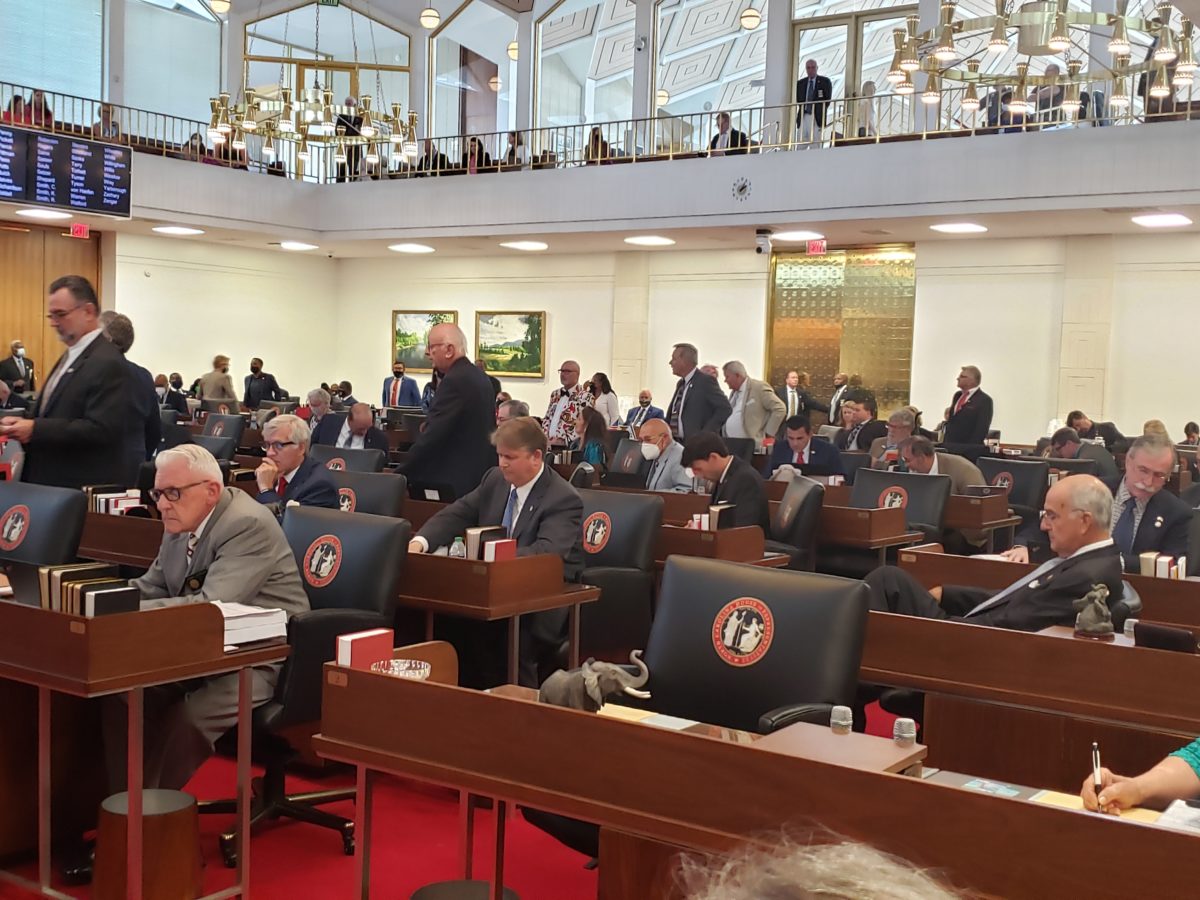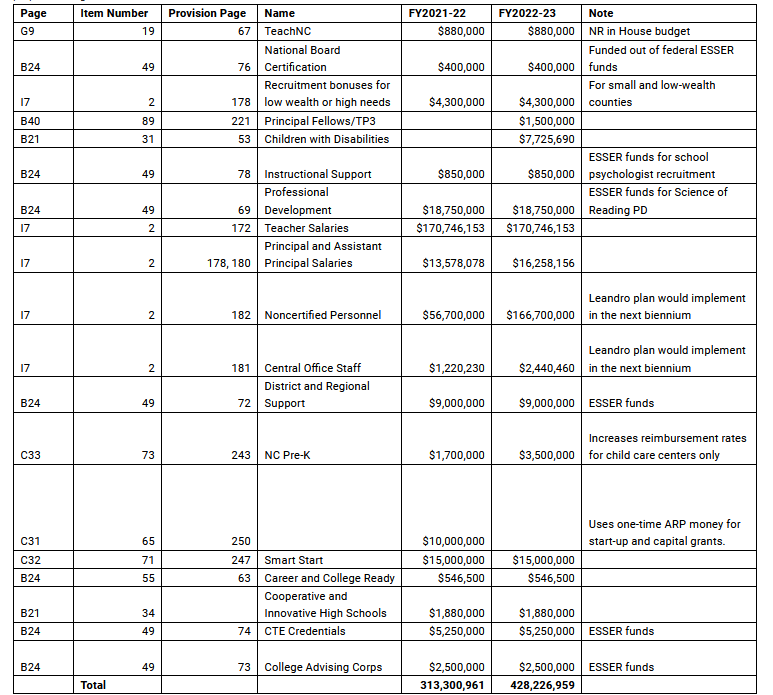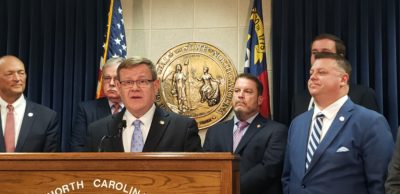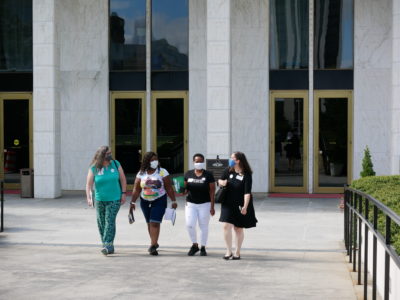
|
|
Editor’s note: A previous edition of this post incorrectly stated that the House’s budget includes 40 provisions related to Leandro. A table provided by Fiscal Research Division below shows the Leandro provisions in the budget.
After hours of debate, the North Carolina House passed its budget proposal by a 72-41 vote mostly along party lines.
The House’s bill, which came over a month after the Senate’s, drew criticism from Democratic legislators because it included several education-related policies that failed as individual bills earlier this year.
The budget proposal invests roughly $21.3 billion in K-12 and $2.4 billion in the community college system over the biennium. Here is some of what those funds are going toward in education. You can read the full bill here, and here is a table of contents to help you navigate.
Compensation
Under the House budget, all state employees would get 5% raises over two years and would be eligible for up to $2,000 in bonuses. Teachers would get an average raise of 5.5% over two years along with several potential bonuses. Community college faculty would get an average raise of 7% over two years and staff would get an average raise of 4% over two years.
You can read more about proposed salary increases for community college and K-12 personnel in our article from earlier this week.
For community colleges, this budget would also allocate $8.6 million recurring to establish a fund to recruit and retain faculty in high-demand fields.
For K-12, the budget would tie school counselor pay to the salary schedule for school psychologists and increase the minimum salary of school staff like custodians and bus drivers to $13 an hour this fiscal year and $15 an hour next fiscal year.
Capital needs
According to the 2017 statewide school construction needs survey, North Carolina’s public school districts’ infrastructure needs top $8.1 billion.
The House budget doesn’t go quite that far, but it includes $50 million in recurring funds for repairs and renovations for K-12 facilities. This means each county will get $500,000 each year.
The budget bill would also transfer about $250 million over two years to the Needs-Based Public School Capital Fund from the Education Lottery Fund. This is significantly less than the Senate’s plan that would transfer a little over $450 million over two years to the Needs-Based Public School Capital Building Fund and another $200 million to the Public School Capital Fund.
Gov. Roy Cooper has proposed a $4 billion bond to meet these infrastructure needs, with $2 billion going to public schools and half a billion going to the community college system.
Special provisions
One of the reasons for the long floor debate was Democrats’ concerns about the many provisions in the budget that were not tied to funding.
House Democrats tried and failed twice to amend the bill to remove many of these provisions, calling them a threat.
“This is not what a budget is for, and particularly at this time after all we’ve gone through with covid,” Rep. Susan Fisher, D-Buncombe, said during Wednesday’s debate. “… This is a time when we should be furthering the education of students.”
We reported on several provisions that were released during the Education Appropriations committee meeting last week, including the creation of a standards review commission and a policy that would require school districts and teachers to post lesson plans online.
But many other provisions made it into the bill that passed the House. Several were directed to the Department of Public Instruction specifically, such as requiring the department to create a full-time position dedicated to recruitment and retention. Another provision would require the department to create online resources to provide information and job opportunities to “future teachers.”
There are several provisions about charter schools in the House budget. One would require the State Board of Education to list reasons why an application to establish a charter school was denied and then give the applicant a chance to reapply.
The bill would also establish an Opportunity Gap Task Force to evaluate gaps and provide recommendations on how public school units can address them.
Hold harmless
The Senate’s budget bill included a provision that prevents a public school district’s funding from being docked if there are enrollment declines due to COVID-19 — holding them harmless.
The House’s budget bill does not have that same provision.
Instead, the House’s budget allocates $40 million nonrecurring in the first year to create a reserve if enrollment exceeds the anticipated amount for this year. At the same time, it reduces both the school bus replacement fund and the state textbook fund, citing declines in Average Daily Membership (a measure for enrollment).
For early childhood, the bill does have a hold harmless provision for licensed child care facilities when it comes to star ratings.
Leandro
The decades-long Leandro v. State of North Carolina held and continues to affirm the state constitutional right of every child to have access to a sound, basic education. Judge David Lee signed an order earlier this year to implement an eight-year comprehensive remedial plan for the state to meet its obligation. The House budget allocates almost three times as much to these initiatives than the Senate bill did.
The Leandro provisions in the House bill are listed below:

But some advocates say it isn’t enough.
Communities for the Education of Every Child NC, a group that advocates for the constitutional right to a sound, basic education, led a demonstration at the state legislature ahead of the budget debate on Wednesday. Speakers, including students, parents, and educators, called on the General Assembly to fully fund the remedial plan.
Emily Escobedo Ramirez, a senior at Cedar Ridge High School in Orange County, talked about how she excelled in reading but was not selected for advanced classes in elementary and middle school. She said she had to become her own advocate, and that’s not fair to students.
“How can we be leaders if we don’t have the adequate supplies and resources that our legislators are supposed to be giving to us?” she asked.
Several legislators echoed these concerns during the floor debate for the bill.
Though the bill funds several pieces of the Leandro plan, several Democrats said they can’t “cherry pick” and that the remedial plan is the bare minimum.
Republicans defended the bill by saying it invests record amounts of money, such as teacher raises.
“This is unprecedented spending that we have not seen before,” Rep. Jeffrey Elmore, R-Wilkes, said.
Federal funds
The House passed a proposal earlier this year detailing how it would spend $3.6 billion in federal funds, and many of these same items are included in its budget proposal.
As a refresher, some of these big ticket items are $36 million in grants to public school units for COVID-19 related needs and $37.5 million for instructor professional development in the science of reading.
The budget proposal, however, also includes more than $6 million for public school units to identify and locate students who went missing due to the COVID-19 pandemic.
It also includes $1.7 million to establish the School Psychologists Grant Program to recruit school psychologists to “improve the safety, mental health, and well-being of students.” It does not, however, include the same proposal the Senate had to allocate $40.9 million in both years of the biennium to ensure that each school has a psychologist.
Broadband
The House budget makes use of federal funds to expand broadband access in the state, which is important heading into another school year that will likely be affected by the pandemic.
For this fiscal year, these items include:
- $100 million nonrecurring for a Broadband Make Ready Accelerator “to support rapid deployment of broadband in rural areas.”
- $1 million nonrecurring for broadband mapping.
- A combined nearly $750 million nonrecurring for the NC GREAT Grant, which provides grants to providers to expand broadband access in rural areas.
Other items
- $585,000 recurring beginning in the 2022-23 fiscal year to expand the Cleveland Community College Prison Education Program.
- $18.1 million nonrecurring in the first year of the biennium for a Smart School Bus Pilot program that would include more than 20 counties.
- $10 million recurring to create a grant program for school safety training and equipment, as well as $1.7 million recurring to create a new facility for the Center for Safer Schools.
- $150 million nonrecurring in the first year for asbestos and lead removal in schools and child care facilities.
- $1 million for the ApSeed Pilot Project, which would prepare preschool-age children up to 4 years old for pre-K through an “interactive learning device” similar to an iPad.
What’s next?
The Senate has already passed its version of the budget bill. Now, the two chambers have to form a conference committee so they can come up with a compromise budget to send to Cooper.
House Speaker Tim Moore, R-Cleveland, has said that the governor’s office will be involved in these negotiations.
Whatever bill the chambers eventually finalize will have to be approved by the governor, and Republicans in the legislature don’t have a veto-proof majority.





